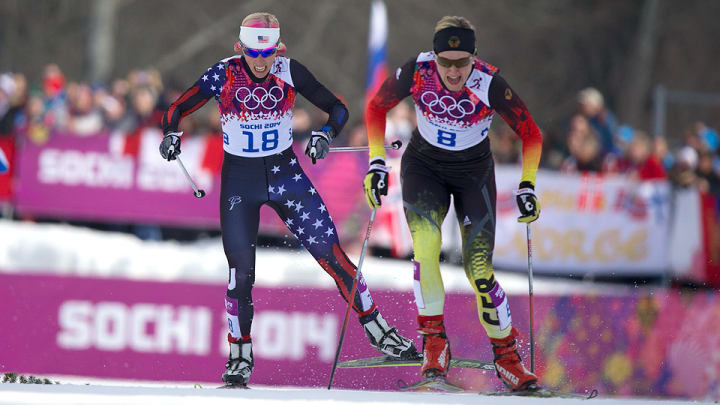Kikkan Randall making the best of a frustrating Winter Olympics

When Bill Koch won the only Olympic medal in the history of U.S. cross-country skiing, in Innsbruck in 1976, no American reporters saw him do it. Having been out watching downhill skier Franz Klammer or speed skater Sheila Young, they had to persuade Koch to slip back into his racing suit and pose for pictures. There was no need for make-up journalism last week, when Kikkan Randall came to Sochi as the best bet ever to end the U.S. drought.
“There were,” she says, “more than a few cameras.”
On Feb. 11 they captured Randall’s failure in the 1.3-kilometer freestyle sprint, the event in which she’s the reigning world champion and had reached the podium in 10 of her last 12 races. Finding herself grouped with three fast rivals in a quarterfinal heat from which only the top two finishers were sure to survive, Randall led them on the descent into the stadium.
But two skiers crossed the line ahead of her, and hopes for a wild-card spot in the semifinals evaporated when a lunge by Italy’s Gaia Vuerich beat her out by .05 seconds. Suddenly Randall was left to watch a dozen others advance in the event for which she had trained on a replica of the Sochi course laid out on Eagle Glacier in her native Alaska.
“That’s sport, right?” she said afterward. “You try your whole life for something like this, and it’s over in two and a half minutes.”
Jessie Diggins of the U.S., who appeared more devastated by her teammate’s failure to advance than her own, said, “My heart broke a little bit.” But Randall is first to say that she doesn’t take sympathy well. She vowed to convert her teammates’ solicitude into inspiration for last Saturday’s 4 x 5-kilometer relay.
Skiing the first leg classical style (skiing in grooves cut into the snow), Randall again opened at the front. But she soon found herself, as she put it, “deep into the hurt box.” By the time Randall tagged teammate Sadie Bjornsen, the Americans were nearly 40 seconds in arrears. They wound up ninth.
Tomorrow Randall will try once more, this time in the team sprint. After giving it long thought, the U.S. coaching staff chose Randall and 23-year-old Sophie Caldwell, with whom Randall has never skied a team sprint before, to alternate the six legs of 1.5 kilometers each using the classical technique. Randall and Diggins won a team sprint gold at last year’s World Championships, but in a freestyle race; the U.S. has never won a medal in a classical team sprint. Back in Anchorage, Randall’s fans will stay up hopefully for one more middle-of-the-night watch party.
Elite cross-country skiing is a brutal, fickle sport that looks no fun to do until you see the sprint, a moveable beast of flashing poles and furious jockeying. With pink streaks in her hair and a reflexive smile, Randall puts a gloss of appeal on cross-country’s Scandinavian self-denial. And the sport’s shared suffering makes for an unusually supportive culture. Justin Wadsworth, the American coach of the Canadian team who won praise last week for supplying a replacement ski to a Russian in distress, was bewildered by all the fuss because, really, it happens all the time.
“That’s what drew me to the sport,” says Randall, who grew up playing youth hockey and skiing downhill. “It’s a community that’s compassionate and fun. We push ourselves to the limit, but still get lit up inside.”
She’s more comfortable with the role of mother hen or pied piper than diva. “It’s not a sport you gravitate to for fame and fortune,” says Randall, who nonetheless collects five-figure purses and endorsement income from such sponsors as BP, L.L. Bean and Kashi, which has put her on a cereal box. But it does allow her to take up a portfolio of causes, outlets for an activist streak that can be traced back to junior high, where she led a fight to restore several cut interscholastic sports. She might talk up Protect Our Winters, a campaign to reverse climate change; or ride a unicycle to appearances for Fast and Female, a program to encourage girls to be active.
She cashed in on those good works after her disappointment in the individual sprint, when an 11-year-old back home emailed to say that she wore her FAST AND FEMALE t-shirt to school the next day because Randall had still flashed a smile at the finish.
In Vancouver, Randall had been the only American woman to finish in the Top 20 of any cross-country skiing event. In Sochi the U.S. has so far placed four in the top 20, including Caldwell, who wound up sixth in the individual sprint. Meanwhile that ninth place in the relay stands as the women’s best result since 1988.
“What’s so cool about this team is it’s not just one skier anymore,” says Randall, who a decade ago signed an autograph for a 12-year-old Diggins. “As tough as it was to experience the emotions of disbelief and disappointment, I won’t take any of it back. And to come in as a medal favorite did so much for the sport and our team.”
The Olympic sprint alternates between freestyle, at which Randall excels, and the classical technique at which she’s not as strong. Thus she’ll be 39 when her next best chance comes around.
But there are other ways of measuring an Olympian’s legacy. If a skier fails, and there’s someone there to hear her, she makes a sound. As teammate Liz Stephen says, “She’s not on that cereal box for herself. She’s on it because she wants us to have a stronger team 10 years from now."

Senior writer and author Alex Wolff, the longest-tenured writer on staff, has traveled to six continents to cover everything from the Tour de France and the World Series to the Olympics and the intersection of society and sports.